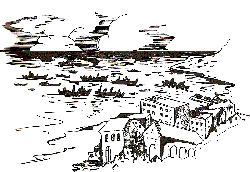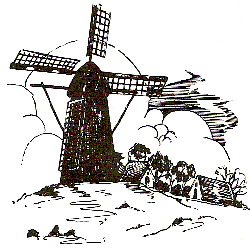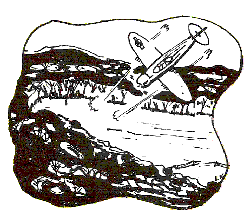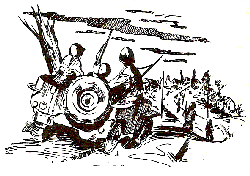| History - 49th A.I.B. - Company 'C' |
 | Index
|
| Index
| | Next |
| Next |
|
(Pages 09-11)
|
T H E J U M P O F F |

Charlie Company was now part of the powerful U.S. Ninth Army. The stay here in Sibbe, Holland, was intended to be brief. The Ninth was to attack in conjunction with the First Canadian Army which had
jumped off on the 8th of February, in an attempt to break through to the Rhine. However, the original plans
of the Ninth Army were altered because the Germans, realizing the Ninth's threat, blew the dams holding the
Roer River. This held up the proposed attack of the Ninth Army for two weeks. Thus C Cqmpany's stay in Sibbe was extended and became one of constant alerts to move out; the thought of combat uppermost in every man's mind. Finally at dawn of the 21st of February, Charlie Company left Sibbe and arrived at St. Odilienberg, Holland, that same morning.
This was it! Relieving elements of the British Seventh Armored Division, the company took up a defensive position along the west bank of the Roer River just east of St. Odilienberg. While occupying this position, the company was under periodic shelling from the enemy just across the river in Melich. Major units of the Ninth Army finally jumped off on 23rd February. Early In the morning of this day, men of the company were
Able to hear and see the greatest aerial and artillery bombardment of the war which preceded the Ninth's jump off.
On the 26th of February, C Company sent out its first combat patrol consisting of fourteen men from the second platoon led by
|
Lt. Kupris. Part of the patrol crossed the river and checked enemy installations and possible river crossings. The patrol reported back the next morning intact. The following night, an eleven man patrol of the third platoon led by Lt. Kimpel, crossed the Roer to again check enemy installations and also secure a prisoner. The terrain over which
these patrols were operating was heavily mined and booby trapped. On this patrol T/Sgt. Paradis rolled on a German Schu Mine while crawling forward and was seriously wounded. The patrol returned at midnight bringing the wounded sergeant with them. A few days later, Pfc. Snyder was seriously wounded and Pfc. McAnally was killed by land mines in the company sector.
Finally on the 1st of March, Charlie Company joined in the Ninth Army's attack. Having been relieved by the 17th Cavalry Group, the company mounted up and proceeded along shell torn roads, past shattered
buildings and over engineer repaired bridges to take it's first objective, Arsbeck, Germany. It was a city
of "firsts" for C Company. First entry into Germany, first contact with German civilians and first billet in
German Homes.

|
-- 9 --

The stay here was short and the outfit was soon on the road again, headed for Aldekerk,
Germany. Very light resistance was encountered here. The "Krauts" were still falling back to fixed positions
so C Company took over. Kraut beef and wine were confiscated and Aldekirk provoked several memorable meals for the men.
Before the break of day on the morning of 5th March, C Company's armored column was rolling East, out of Aldekirk. Only an intermittent trail of dim blackout lights broke the blackness of the countryside.
A cold chilling wind blew down the column rousing rifle-men from their drowsiness as they were jostled by the grind of the tracks. Alerted hours before, they had hurriedly stowed the vehicles and returned to billets to catch what sleep they could until the order to move out, was given.
Lt. Kimpel's third platoon had preceded the company by an hour to furnish security for construction units of the 53rd Engineers laying a bridge near Linfort. By midmorning the column was halted in the vicinity of Eyllsche and the platoons dismounted to cross a bridge recently destroyed by the enemy. Advancing in an approach formation, the column entered Linfort through which the main element of the 49th Battalion would pass. Resistance was encountered in the North edge of the city but the enemy was quickly
routed with nineteen prisoners being taken, one killed and one wounded. Having reorganized, the tracks were brought up and again the company waited to move forward.
Early in the afternoon as the column rolled out of Linfort, a lone German fighter plane bore down without warning on the tail of the column, but the strafing was ineffective and the plane escaped, leaving two hundred fifty Gl's tense and alert.
All roads leading out of Linfort were congested with armor advancing in the attack. The C Company column lost contact with the battalion for a time but was intercepted by Lt. Schufford of the battalion
|
staff with orders from Col. Kimball to rush the company ahead to aid tank units badly in need of infantry support near Rheinberg. Captain Clark and Lt Lybrand of the first platoon reconnoitering the route to Col. Kimball's position found the flat ground northeast, over which the column would pass, soft and marshy with only scattered wooded areas to provide concealment from enemy observation. As the halftracks were led forward, they engaged in a fire fight with snipers and scattered enemy in the wooded areas. Because of marshy ground, the first platoon was separated from the company and from their platoon leader. Contacted by Col. Roseborough the platoon was sent ahead mounted, with orders to advance until fired upon by the enemy. The remainder of the company dismounted and advanced on foot, passing through the first platoon which by this time had been halted by enemy fire at a road junction. Farm buildings across the road from which the fire was coming were attacked and forty prisoners taken.
On orders from Col. Van Houten, commanding the 36th Tank Battalion, Captain Clark quickly reorganized the company and prepared to attack to the right of the tanks across the flat open approach to Rheinberg. The tanks were to secure the left flank and provide a base of fire for the advancing infantry. The anti-tank platoon was left to defend the area around the vehicles. The company jumped off into the attack
with the first platoon on the left, the second on the right and the third platoon in reserve. However, in
the early stages of the advance a change of orders by Col. Kimball sent Lt. Kimpel's third platoon to
replace the tanks engaged in securing the left flank, thus leaving the company, without the knowledge of
Capt. Clark, minus supporting fire and a reserve force. The tanks were sent forward to reinforce other elements
of the 36th Tank Battalion which were wavering in the face of devastating 88mm fire on the outskirts of
Rheinberg. As the first and second platoons proceeded in the attack they became pinned down near a small
canal by heavy fire emminating from houses overlooking the flat approach. It was here that Lt. Kupris was
instantly killed by machine gun fire while attempting to maneuver his second platoon. The Company commander, pinned down with the second platoon gave orders through the platoon radio operator, Pfc. Read, for the first platoon to advance forward as far as possible on the left flank. T/sgt. Rutkowski (now Lt.) realizing the plight of his forward squads led his machine gun and mortar squads under intense small arms fire to a draw through which they advanced to a position where they could threaten the enemy's left flank.
|
-- 10 --
|
Calling for the third platoon, which to his knowledge was still in support, Capt. Clark then learned that they had been committed to the left flank. Fortunately, however they were able to advance to such
a position as to control the complete left flank of the installations being attacked. Due to the presence of
mind of Lt. Young, then commander of Headquarters Company of the 49th Battalion, two assault guns were
moved up in close support of the other troops, delivering intensive supporting fire. As the company closed in
on the objective a white flag was hoisted and the squads went in to take one hundred and thirty seven
prisoners and count fifteen dead. In taking this objective the company sustained ten casualties. Lt. Kupris, S/Sgt. Ridley, Pvt. Johnson, Pvt. Schraff and Pvt. Trahan were killed. And Pfc's Goshert, Valadez (now Sgt.), Mitchell, Borey and Herodes were wounded.
Meanwhile, near Rheinberg where a major element of the 36th Tank Battalion had been halted before a line of dug-in "panzerfausts" and anti-tank guns, it became apparent, after the loss of a number of tanks that a further advance would be impossible unless infantry support could be provided. On command of Col. Kimball, a small task force was organized by Capt. Look, 49th Battalion S-2, consisting of the anti~tank, and elements of the first and third platoons. Advancing mounted until they reached a blown bridge, they dismounted and continued on foot. Constantly under heavy artillery, 20mm and small arms fire, they soon became pinned down and only ten men were able to reach the railway station around which the tanks were engaged. When the two supporting tanks which formed the base of fire were knocked out, Captain Look ordered the men to take cover in buildings Along the road.
|
Time after time during the night, these men left the shelter to go to the aid of wounded tankers and members of their own group who lay under enemy fire in the near vicinity. It was here that for their heroic and meritorious achievements T/Sgt. MacFayden, S/Sgt. Frank Burney, Pvt. Gool, Pfc. Griffeth and Pfc. Masarik won decorations. The group was often in close enough contact with the enemy to be harassed by fragmentation and fire grenades. Only the following morning after the city had been cleared could they evacuate the wounded. It was in this action that S/Sgt. Prokop, Pvt's Koch, Hayes, and Nixon were killed and Pvt. Ulmer reported missing in action. Pfc's Warner, Zembles, Withers and Urban were wounded.

At sunset that evening, action had ceased in the company sector. Another cold black night blanketed the line of defensive positions where the platoons had dug in to defend the ground taken during the day. C Company smashing headlong into the Wesel pocket, had engaged elements of Germany's crack 116th Panzer
Division and successfully attained their objective in the toughest battle that they were to have in Europe. The
actual engagement had probably lasted no more than three hours but in that short time they had experienced
a great part of all that is to be seen and accomplished in modern warfare.
|
-- 11 --
|